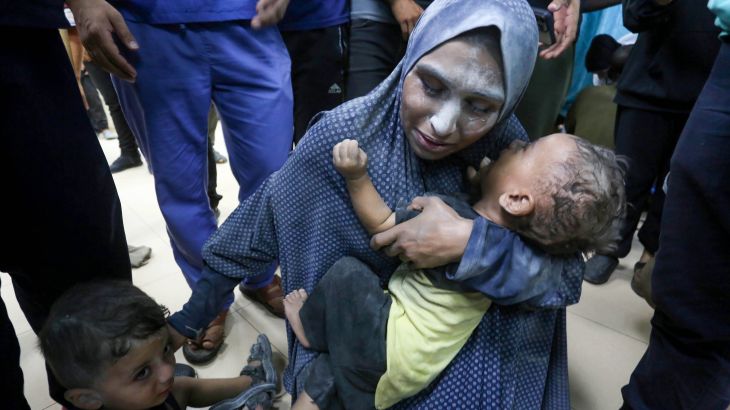Israel kills more than 40,000 Palestinians in Gaza, 16,456 of them children
As the world mourns a ‘grim milestone’, talks to halt nearly 11 months of a devastating Israeli offensive are under way in Qatar.
Video Duration 01 minutes 20 seconds 01:20Published On 15 Aug 202415 Aug 2024
Israel’s relentless war on Gaza has killed more than 40,000 Palestinians, at least 16,456 of them children and over 11,000 women.
Gaza’s Health Ministry on Thursday announced the grim milestone, a figure that is likely an undercount as most of the missing 10,000 Palestinians are believed to be buried under mountains of rubble.
Keep reading
list of 4 itemsend of list
Shortly after the ministry’s announcement, a new round of ceasefire talks aimed at stopping the war began in the Qatari capital Doha on Thursday afternoon.
The United Nations says Israel’s bombardment has damaged or destroyed two-thirds of buildings across the Strip.
“Today marks a grim milestone for the world,” said UN High Commissioner for Human Rights Volker Turk. “This unimaginable situation is overwhelmingly due to recurring failures by the [Israeli military] to comply with the rules of war.”
People carry the body of a Palestinian killed in an Israeli raid on a cemetery where displaced Palestinians shelter in Khan Younis in the southern Gaza Strip [Hatem Khaled/Reuters]
Al Jazeera correspondent Hani Mahmoud, reporting from Deir el-Balah in Gaza, said the 40,000 figure is “a very conservative reading of the number of casualties across Gaza”.
“There are still those who are missing and trapped under the rubble, [who] haven’t been identified, haven’t been collected, haven’t been counted yet,” he said.
“There are those who are missing, whose family members don’t know anything about their whereabouts. There are those who were evaporated, given the intensity and the scale of the bombs.”
Israel’s unsparing campaign in Gaza, the subject of allegations of genocide before the International Court of Justice (ICJ), has displaced more than 90 percent of the Strip’s population and created a humanitarian disaster, worsened by Israel’s widespread denial of essential humanitarian assistance into Gaza.
Despite the ICJ ordering Israel to allow aid for Gaza, July marked the lowest levels of assistance entering the Strip since October 2023, when the war began following an incursion by Hamas into southern Israel that killed more than 1,100 people, many of them Israeli civilians.
Amid deteriorating conditions, famine and deadly diseases such as polio have spread through Gaza.
“We need a ceasefire, even a temporary ceasefire to successfully undertake these campaigns. Otherwise, we risk the virus spreading further, including across borders,” said Hanan Balkhy, regional director for the World Health Organization (WHO).
The death toll offered by the Health Ministry is conservative, with a study published in the medical journal The Lancet in July stating that the figure could reach as high as 186,000 people, a number that would represent about 8 percent of Gaza’s entire population.
Israeli forces have targeted schools, humanitarian workers, medical facilities, and UN shelters throughout the war, including some hosting many displaced people. Israel states that such facilities are used by Hamas for military purposes, but those claims often lack evidence.
In the first 10 days of August, Israel struck at least five schools across Gaza, killing more than 150 people.
Reports of abuses by Israeli forces such as systematic torture, extrajudicial killings, and the destruction of civilian infrastructure, agricultural land, and religious and cultural sites, have also been prevalent throughout the war.
The war has also been the deadliest in modern history for journalists, with the Committee to Protect Journalists stating that 113 media workers have been killed since the war began, 108 of them Palestinian.
With Israel blocking outside journalists from entering the Strip, Palestinian reporters have endured exhausting conditions and the danger of Israeli attacks to document conditions for civilians on the ground in Gaza.
The United States has played a central role in the war, with enormous weapons transfers underwriting Israel’s campaign despite reports of rampant violations of international law. The Biden administration announced last week it had cleared an additional $20bn in weapons sales to Israel.
“There is such an erosion of the very foundation of international law,” Francesca Albanese, UN Special Rapporteur for the occupied Palestinian Territories, told Al Jazeera.
“This system [of international law] was birthed after the Second World War to prevent and punish atrocities like this, especially to prevent. So it has failed. But also, it tells us that there is a huge hypocrisy in the system, because a few powerful states have the capacity to determine to whom international law can be applied, and to whom it cannot, and Israel is in the latter category. This is unacceptable,” she said.
